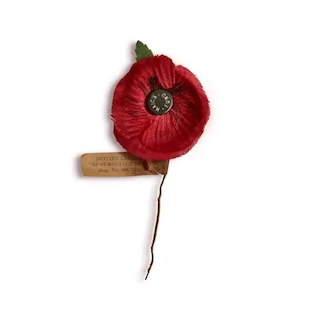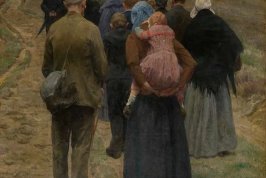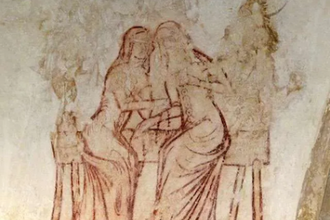Gospel in Art: Obstacles are sure to come

Red Poppy, early 1930's, Lawn cloth, silk and metal © The Royal British Legion
Source: Christian Art
Gospel of 11 November 2024
Luke 17:1-6
Jesus said to his disciples: 'Obstacles are sure to come, but alas for the one who provides them! It would be better for him to be thrown into the Sea with a millstone put round his neck than that he should lead astray a single one of these little ones. Watch yourselves!
If your brother does something wrong, reprove him and, if he is sorry, forgive him. And if he wrongs you seven times a day and seven times comes back to you and says, "I am sorry," you must forgive him.'
The apostles said to the Lord, 'Increase our faith.' The Lord replied, 'Were your faith the size of a mustard seed you could say to this mulberry tree, "Be uprooted and planted in the sea," and it would obey you.'
Reflection on the Red Poppy
Today is Armistice Day. The Armistice was an agreement to end the fighting of the First World War as a prelude to peace negotiations. It began at 11am on 11 November 1918. The word "armistice" comes from the Latin words "arma" meaning "arms" (as in weapons) and "stitium" meaning "a stopping." Literally, it means "a stopping of arms" or a temporary suspension of hostilities. To this day we mark Armistice Day around Europe with a Two Minute Silence at 11am on the 11th day of the 11th month.
In our Gospel reading today, Jesus speaks about the inevitability of stumbling blocks but also the necessity of forgiveness, even when wrongs are repeated. This message of mercy and reconciliation ties deeply with the spirit of Armistice Day. Just as Jesus calls His followers to forgive and seek peace, Armistice Day reminds us of the importance of laying down arms and striving for peace after the devastation of conflict. Today, especially, we pray for all conflicts around the world, including those in Ukraine, Gaza, and Lebanon. We ask that all involved seek a cessation of hostilities, recognising that true peace can only come through forgiveness, reconciliation, and a shared desire for healing. May God guide hearts towards peace.
Many of your will have been wearing red poppies these past days. The tradition of wearing the red poppy to commemorate fallen soldiers began after World War I, inspired by the poem In Flanders Fields by John McCrae, which described poppies growing among the graves of soldiers in the war-torn fields of Belgium. The red poppy became a symbol of remembrance, representing the bloodshed and sacrifice of those who fought in the war. The idea of using the poppy as a symbol of remembrance was first conceived by American academic Moina Michael, who began wearing it herself and promoted its use as a symbol of tribute. Frenchwoman Anna Guérin further popularised the red poppy, and in 1921, the British Legion adopted it, beginning the tradition of wearing red poppies in the lead-up to Armistice Day. The Royal British Legion, which had been formed that same year, ordered nine million poppies and sold out, raising £106,000. For the 2024 Poppy Appeal, around 40,000 volunteers distribute over 40 million poppies.
LINKS
Gospel in Art: https://christian.art/
Today's Reflection: https://christian.art/daily-gospel-reading/luke-17-1-6-2024/


















